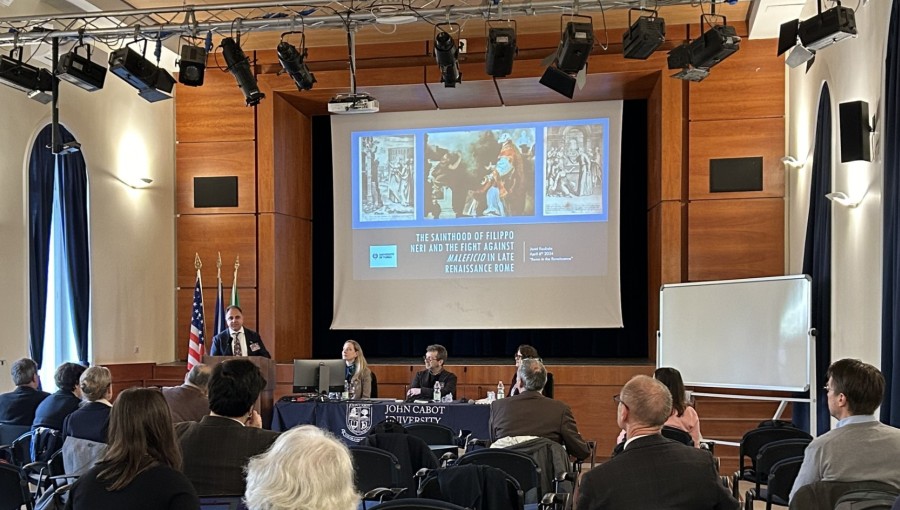“Rome in the Renaissance” International Conference held at JCU on April 5-6
On April 5 and 6, John Cabot University hosted the international conference “Rome in the Renaissance: Global Projections on Religious Identities and Dissent.” The conference was organized by John Cabot University History Professor Fabrizio Conti in cooperation with Professors Paolo Broggio and Andrea Vanni of the Department of Humanistic Studies at Roma Tre University and was sponsored by JCU President Franco Pavoncello and the Department of History and Humanities.
This was the first conference ever organized on this specific topic, attracting the participation of numerous scholars from universities around the world in a two-day event rich in discussion and insights. The conference was followed by a dinner in the Lemon Tree Courtyard of the Guarini Campus.

The attendees especially appreciated the student workshop held at the conclusion of the conference, with the participation of 13 students from Professor Conti’s Italian Renaissance and Magic & Witchcraft courses. The students, organized in groups of two or three, presented on topics that ranged from marginalized women and prostitution in Renaissance Rome to Pope Paul II against humanists, from Heinrich Kramer on witches, saints, and Rome, to witch trials in Rome and the Italian peninsula in the Renaissance. Professor Manfredi Merluzzi, Chair of the Department of Humanistic Studies at Roma Tre University, strongly appreciated the JCU undergraduate students’ involvement in an international conference of this kind, and praised their presentations as particularly well done and delivered, expressing the idea that there is mutual benefit that can be generated from cooperation between the American liberal arts approach and the Italian educational tradition.
The two keynote speakers presented on challenging topics. Professor Gábor Klaniczay (Central European University in Budapest/Vienna), gave a talk on “The Ambivalence of the Supernatural: Saints, Visionaries, Witches and Magicians in Renaissance Rome,” and Professor Giorgio Caravale (Roma Tre University), delivered a talk on Rewriting Renaissance. Both speakers offered an innovative view of the topics they addressed, discussing the breadth of the Renaissance, which is truly global in both a geographical and ideal sense, but also interdisciplinary in its focus on a religious-cultural perspective.
The presenters were divided into several panels that approached Rome in the Renaissance from a variety of points of view and methodological angles, from the more religious-institutional one at the level of the Roman Curia, to the development of the Inquisition, to the relationship between different faiths and cultures, such as Jewish and Muslim in the Rome of the time and at the Mediterranean level, to the relationship between women and culture, and again, the spiritual conquest promoted by a global Rome, the issues of witchcraft and religious dissent, but also holiness and mysticism as well as art and iconography in the Roman Renaissance perspective and beyond.
The publisher Routledge has expressed interest in selecting and publishing the papers presented at the conference, which will lead to a collected volume that will be co-edited by Professor Fabrizio Conti.
The conference was an opportunity for the presentation of high-profile research papers and, at the same time, an occasion to connect the fields of research and teaching, professors and students, that are usually disconnected when it comes to scholarly discussion and production. All this was possible through a fruitful collaboration between John Cabot University and Roma Tre University, one of Italy’s leading public research universities: a form of cooperation with very high potential, of which the conference organizers hope this will be only the beginning.
Fabrizio Conti (Ph.D., Central European University, 2011) is a lecturer in History at John Cabot University in Rome and an Arts and Humanities Advisor at the American Academy in Rome. Since 2021, he has also been the co-director of the Central European University’s Summer School on the history of magic and witchcraft in Budapest. Prof. Conti’s teaching and research interests span the Late Antique, Medieval, and Renaissance periods, with an interdisciplinary approach to religious and cultural developments, and a focus on the history of magic and witchcraft. Currently, Prof. Conti is working on a textbook for university students on the history of magic and witchcraft from antiquity to the Renaissance to be published with Routledge. Among his publications are the volume co-edited with Stefan Lorenz Sorgner Humanisms and Beyond: Past, Present, and Future of the Humanities in Liberal Arts Education, (Trivent, 2023), with a foreword by Franco Pavoncello, another co-edited with Elizabeth Ann Pollard Magic in the Roman World (8th c. BCE – 5th c. CE) (Trivent, 2022), the edited volume Civilizations of the Supernatural: Ritual, Witchcraft, and Religious Experience in Late Antique, Medieval, and Renaissance Traditions, with a foreword by Teofilo F. Ruiz (Trivent, 2020), as well as the monograph Witchcraft, Superstition, and Observant Franciscan Preachers: Pastoral Approach and Intellectual Debate in Renaissance Milan (Brepols, Europa Sacra series, 2015). Prof. Conti has worked in the catacombs of Rome as a docent and in the Vatican Secret Archive as an archivist, besides appearing in several TV documentary series.





